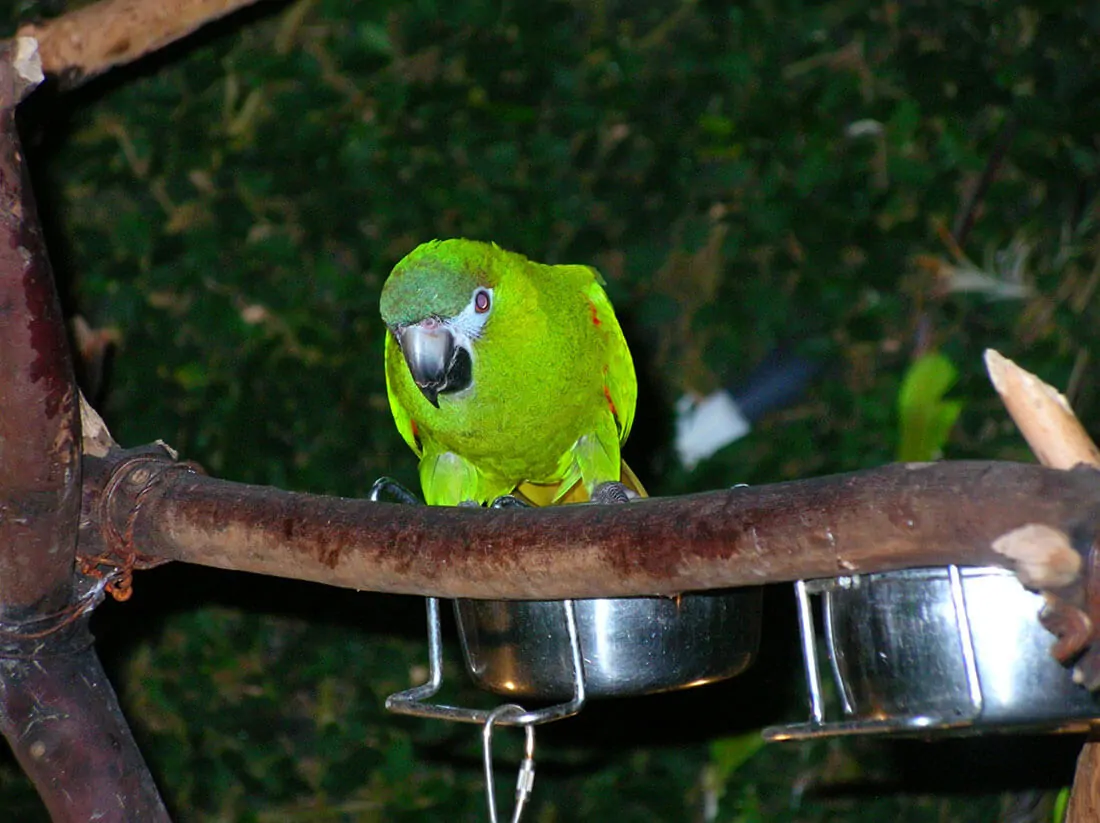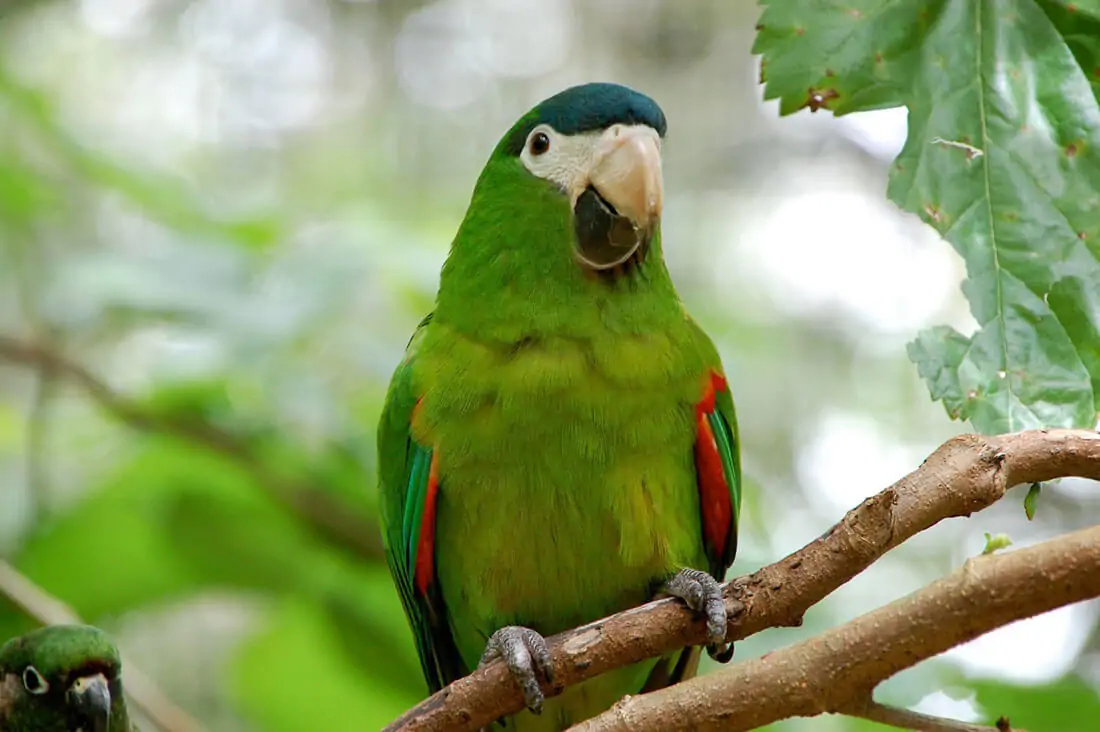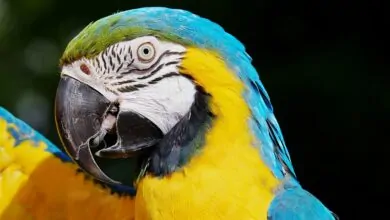Red-Shouldered Macaw
Red-shouldered Macaw can either be seen on television, the internet or we can read about them. These are one of the smallest species of the parrot family; dressed in a green and attractive plumage. They are also known as noble, long-winged, mini or Hahn’s macaw. Despite their small stature, they possess all the intelligence, curiosity, and energy characteristic of their larger relatives.
Major Specifications:
- Lifespan: 50 years
- Scientific name: Diopsittaca Nobilis
- Family: Psittacidae
- Rank: Species
- Status: Least concern
These are known for their playful and affectionate nature, making them popular among bird lovers. They are native to South America, primarily found in countries such as Brazil, Bolivia, Venezuela, Peru, and the Guianas.
Table of Contents
Their ability to adapt to various environments, from tropical lowlands to swamplands, contributes to their stable population. Recognized for their interactive behavior and ability to mimic human speech, these macaws are both entertaining and challenging pets, requiring dedicated care and engagement from their owners.
The physical appearance of Red-shouldered macaw

Red-shouldered macaw is 30 cm long with a weight of 150 g. Like all macaws, it has a long tapering tail and a large head. These features coupled with bright green feathers on the body and dark blue feathers on the head. Similarly, just above the beak-the wings and tail have feathers that are bright green above and olive-green below. The underside of the wings is red. Likewise, their eyes are orange, and the skin around the eyes is white without feathers.
The behaviour and personality of the noble macaw
Red-shouldered Macaws are very social birds and are generally seen in small groups in trees, or in flocks when flying. In like manner, these birds are adorable, affectionate, and clever in subjugation and love to play around and can be quite troublesome. The red-shouldered macaws are very eager for attention but they can be peculiar sometimes.
These birds need space and exercise and will become overweight if confined for too many hours a day. Remember, too, that macaws are extremely intelligent birds and need a lot of stimulation to maintain a healthy attitude. A depressed macaw can build neurosis and self-mutilating disorders.
Abode of red-shouldered macaw
These birds are native to the savannah, swamplands, and tropical lowland habitats and make their home and best survival in tropical lowlands. In the wild, they live in Bolivia, Brazil, the Guianas, Peru, and Venezuela. Their green colouring is perfect for camouflaging into the greenery. Additionally, some Noble macaws also prefer swamplands as it is suitable for them.
What do they eat?
Red-shouldered macaws spend most of their mornings searching for food, including berries, fruits, flower buds, nuts, and seeds. Uniquely, sometimes they eat insects and the clay in their meal is a dietary supplement that helps remove any toxins they may pick up from their normal food sources.
They enjoy spray millet. They devour multiple vegetables, cooked maize, fresh corn, green beans and the berries of hawthorn, etc. Furthermore, sprouted sunflower seed that has just started to germinate is another excellent food.
Training
Training a Red-shouldered Macaw requires patience, consistency, and positive reinforcement. They are intelligent birds who have high intellectual abilities. These birds can quickly learn commands, tricks, and even words and phrases. Therefore, it is essential to start training your macaws from an early age to develop good habits and prevent undesirable behaviors.
Lifespan
These birds are reported to live for more than 40 to 50 years if they are cared for properly. When these macaws are kept as a pet, there is no threat to their life from predators.
Availability
Red-shouldered macaw was exported in large numbers to Europe from Guyana until the importation of wild-caught Parrots ended in 2005 because of avian influenza. Young birds bred in the UK are usually available during summer and autumn.
Suitability
This species is a manageable size for the home but it is not perfect because its voice is loud. However, if it receives a lot of attention in the form of things to keep it occupied, the noise level should be acceptable.
Its white upper mandible distinguishes the noble macaws. It is rare in aviculture as it originates from Brazil and there has been no legal export from that country for more than 50 years.
Red-shouldered macaws in captivity

Noble macaws were caught and imported but this practice has stopped due to current laws ceasing because these macaws are one of the endangered species. Adding to it, red-shouldered macaws frequently bred in captivity for the pet trade. Though their wild populations have declined locally due to habitat loss. They are listed as Least Concern by IUCN and are listed on Appendix II of CITES, trade restricted.
Price of red-shouldered macaws
You have to pay between $700 to $1200 for a hand-raised macaw. Surprisingly, the noble macaw is highly prized for their “large macaw” personality in a mini-macaw body.
Vocalization of red-shouldered macaw
These are noisy birds, especially if you have more than one as well as they can be wonderful talkers and will learn many words and phrases. The red-shouldered macaws have a grating voice (the most pleasant-sounding birds in the parrot family).
Hahn’s macaws are 12 to 14 inches long so they are better suited for apartment living than large macaws, but only if your neighbors are deaf.
However, Hahn’s macaws will pick up a lot of words and phrases and can be excellent talkers. Hahn’s macaws can also whistle well, however they might choose to whistle rather than talk, therefore practice talking before teaching them to whistle.
Breeding
The breeding season starts in February or March and extends till June or July.
As you know that these birds are noisy and when they are alarmed that something exciting is going to happen, they make extra noise.
They can be very strong chewers which require a lot of natural branches to satisfy the urge to chew. A clutch have of 4-6 eggs that incubates for about 23 days. The young fledge are independent about one week after leaving the nesting box.
Health & Common Conditions
Just like all parrots, Red-shouldered Macaws also need proper care to stay healthy. They can face several common health problems, so regular vet check-ups are important for catching any issues early. Another problem is Macaw Wasting Syndrome (PDD), a viral disease that affects the digestive and nervous systems. This disease brings out symptoms of weight loss, regurgitation, and trouble digesting food. Unfortunately, there is no cure. So, early detection and care can help improve the bird’s quality of life.
Nutritional problems may arise, particularly for birds that don’t get a balanced diet. A healthy diet should be given to them , which may include fresh fruits, vegetables, nuts, seeds, and special pellets made for parrots. The supplements that are needed to prevent deficiencies are calcium and vitamins. The deficiency of these both may cause brittle bones or a weakened immune system.
The key in keeping a Red-shouldered Macaw healthy, demands care from you that comprises routine vet visits and healthy diet. These birds can live for up to 50 years, only if the right amount of care is given to them. Since, owning them is considered a long-term commitment.
Get a Hahn’s Macaw
This macaw is easier to find than some of the other species and it is a favorite of bird breeders. You likely won’t find a red-shouldered macaw in a large pet store, but from avian-specialty stores and from bird breeders.
Featured Image Courtesy by Flickr
